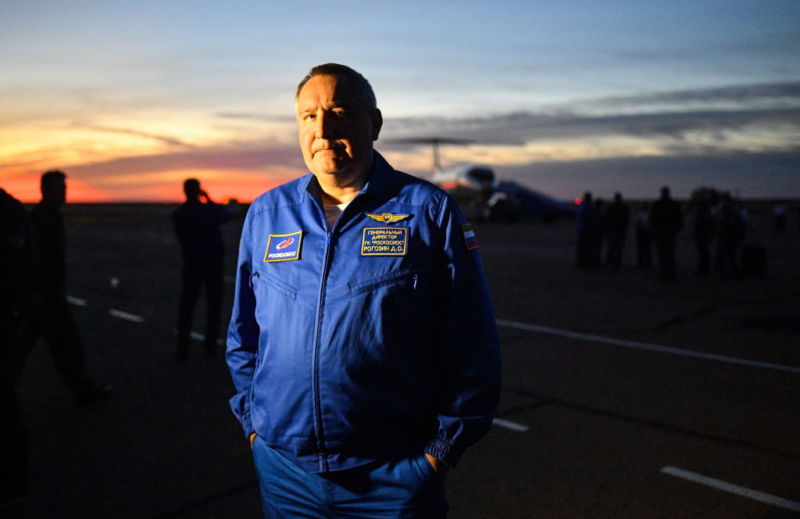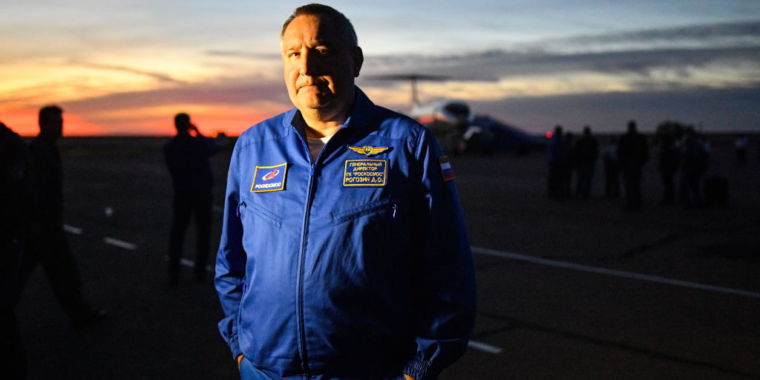
Alexei Filippov/TASS via Getty Images
For a few weeks now, the head of Russia’s space activities has been saying that the United States and its Western allies must end sanctions against his country before March 31, or face the consequences when it comes to cooperation with the International Space Station.
After those sanctions remained in place at the end of March, Roscosmos director general Dmitry Rogozin promised to provide a response on April 2. True to his word, he did so early Saturday morning. To be full Twitter thread can be found herebut it’s pretty easy to sum up: more commotion, more threats, but probably little change.
In his new letter, Rogozin continues to demand a “complete and unconditional” end to Western sanctions, and he still threatens to end cooperation on the International Space Station. In particular, Rogozin said Roscosmos will soon send “specific proposals” to complete its cooperation on the space station to the Russian government.
This had sparked a storm of media attention today saying that Russia will end its cooperation on the International Space Station (see, for example, here and here). Such reporting lacks a fundamental understanding of Dmitry Rogozin and the Russian approach to spaceflight.
The collaboration on the space station will, of course, end at some point in the future. Some hardware has been flying in space for nearly 25 years and will eventually become obsolete. And while it’s possible that Russia could decide to end the partnership this month, that seems unlikely. Russia is currently committed to operating the station until 2024, and even as the war in Ukraine rages on, there have been talks about potentially extending operations to 2030.
NASA’s preference is to continue operating the station until 2030, and for reasons that include a desire not to violate international treaties, the United States, along with Europe, Japan and Canada, are unlikely to renew the partnership with Russia. break. That basically leaves the decision to Russia.
Rogozin has been roaring about pulling the plug on the International Space Station almost since the war against Ukraine began. But he and the thousands of Roscosmos employees took exactly zero concrete actions that would actually kick-start that process. Indeed, earlier this week, NASA astronaut Mark Vande Hei returned to Earth on a Soyuz spacecraft. The operations were completely nominal and relations between Russian and NASA officials were professional.
It is possible that Vladimir Putin could decide at any time that it no longer suits him to participate in the space station. Its decision-making process is opaque to Western observers. But this seems unlikely, as running away from the space station would be the equivalent of a wrecking ball to Russia’s civilian space program. And Russians are immensely proud of their space program, which dates back more than six decades to Sputnik and Yuri Gagarin. However, without active cooperation with Western countries, Russia would almost certainly cease to be a space power – it would be the world’s first earlier space power.
As part of his Twitter post, Rogozin shared letters he had received from the chiefs of other space agencies in response to his demands to end the sanctions. Notable is a March 30 letter from NASA administrator Bill Nelson, promising his continued support for the space station, but reiterating that the sanctions will not end. Nelson is not negotiating from a weak point here. The United States has a vibrant commercial space industry that will thrive even without the space station. Nelson also knows that NASA could probably take steps to save and fly the US portion of the space station, even if Russia pulls out abruptly.
Nelson’s letter, however, contains no fuss or threats. Instead, he offers a fig leaf. While the United States will not lift its sanctions, Nelson writes, if the Russian space industry needs Western components to support the flights of Russian Soyuz or Progress vehicles to the space station, NASA will work to facilitate such technology transfers. “Maintaining safe and successful ISS operations remains a priority for the United States,” Nelson wrote.
You can probably safely assume that the Russians feel the same way.

